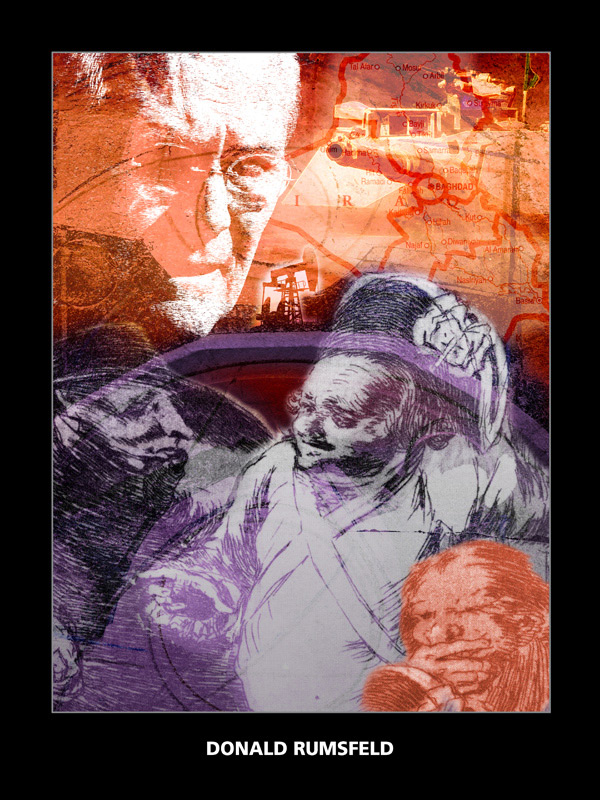Dialogues › Sleep of Reason › Donald Rumsfeld

Summary
Donald Rumsfeld was a four-term congressman from Illinois, served twice as secretary of defense, and held various other positions in the Nixon and Ford administrations.
He was also president of the pharmaceutical company G.D. Searle, ceo of General Instrument, and chairman of Gilead Sciences. Searle became profitable due to the discovery of aspartame during his tenure, and is believed to have earned him $12 million when the company was sold to Monsanto in 1985. Gilead Sciences developed Tamiflu , used in the treatment of bird flu.
Rumsfeld graduated from Princeton and served in the Navy in the mid-1950s as a pilot and flight instructor.
During the Nixon administration he worked as director of the Office of Economic Opportunity in the Nixon administration and hired Dick Cheney to serve under him. Nixon later named Rumsfeld counselor to the president, director of the Economic Stabilization Program, and ambassador to NATO. Nixon said on tape, “at least Rummy is tough enough” and “He’s a ruthless little bastard, you can be sure of that.”
Rumsfeld served as transition chairman for the Ford administration and then as Ford’s chief of staff before being named the youngest secretary of defense. He oversaw the transition to an all-volunteer military, an idea he was introduced to at seminars at the University of Chicago when he was a congressman. He also oversaw the development of cruise missiles, the B-1 bomber, and a major naval shipbuilding program.
Ford awarded Rumsfeld the Presidential Medal of Freedom in 1977, the nation’s highest civilian award.
Rumsfeld returned to public service from the private sector when George W. Bush named him secretary of defense, the oldest person to hold the position. Bush directed him to modernize the military and turn it into a lighter fighting force. He reorganized the global command structure.
He lead and executed the invasions of Afghanistan and Iraq after 9/11 and established the Rumsfeld Doctrine in these conflicts, a push to send in the smallest possible number of forces.
At the start of the Iraq war, Gen. Newbold called for 500,000 troops, which Rumsfeld said was the “product of old thinking and the embodiment of everything that was wrong with the military.” When France and Germany criticized the invasion of Iraq, he said they were the “Old Europe.”
In a 2002 interview, Rumsfeld said, “I can't tell you if the use of force in Iraq today would last five days, or five weeks, or five months, but it certainly isn't going to last any longer than that.” After nine more years, more than 60,000 casualties and $1 trillion, President Obama wound down the Iraq war.
Infighting between Colin Powell at the State Department, Cheney, and Rumsfeld sometimes resulted in polarizing the administration on critical issues, including Iraq and North Korea.
Rumsfeld also had disagreements with the CIA over who had authority to fire missiles from drones, delaying their use against al Qaeda. Someone involved in this argument said, “Rumsfeld never missed an opportunity to fail to cooperate. The fact is, the Secretary of Defense is an obstacle. He has helped the terrorists.”
It was decided by the administration that existing prison facilities in Iraq would be used to detain enemy combatants without protection of the Geneva Convention. Rumsfeld offered to resign after the torture and abuse scandal at Abu Ghraib. He supported the administration’s enhanced interrogation techniques, including waterboarding, which were also used at Guantanamo, Cuba.
In early 2006, eight retired generals and admirals called for Rumsfeld to resign because of his “abysmal” military planning and lack of strategic incompetence. Bush defended Rumsfeld but accepted his resignation just after the 2006 elections, when Republicans lost both houses of Congress. Cheney called him the “finest secretary of defense this nation has ever had.”
Since leaving office, Rumsfeld often criticized Secretary of State Condoleezza Rice. She replied in 2011, saying that he “doesn't know what he's talking about.”
Quotes
In a November 2002 interview with Infinity CBS Radio, Secretary of Defense Donald Rumsfeld said,
“I can't tell you if the use of force in Iraq today would last five days, or five weeks, or five months, but it certainly isn't going to last any longer than that.” After nine more years, and more than 60,000 casualties and $1 trillion, President Obama ended the Iraq war.
(Source)
“Reports that say that something hasn't happened are always interesting to me, because, as we know, there are known knowns; there are things we know that we know. There are known unknowns. That is to say, there are things that we now know we don't know. But there are also unknown unknowns. There are things we do not know we don't know.”
(Known and Unknown: A Memoir, Feb. 2011, quote from a February 12, 2002 press conference – Source)
“I would not say that the future is necessarily less predictable than the past. I think the past was not predictable when it started.”
(April 3, 2003 – Source)
“Death has a tendency to encourage a depressing view of war.”
(2003 – Source)
“I believe what I said yesterday. I don't know what I said, but I know what I think, and, well, I assume it's what I said.”
(Feb. 2003, news conference – Source)
“Needless to say, the President is correct. Whatever it was he said.”
(Feb. 28, 2003 – Source)
“If I know the answer I'll tell you the answer, and if I don't, I'll just respond, cleverly.”
(addressing troops at Bagram Air Base, Afghanistan, 27 April 2002 – Source)
